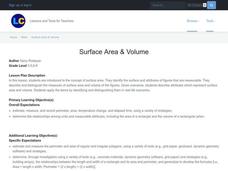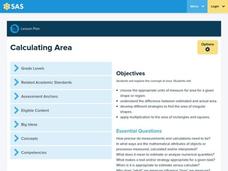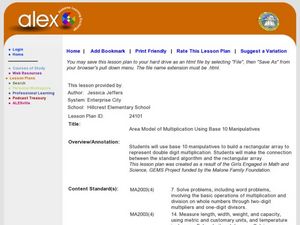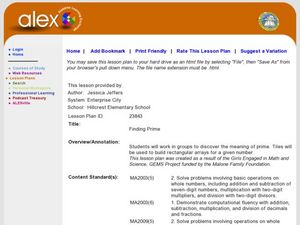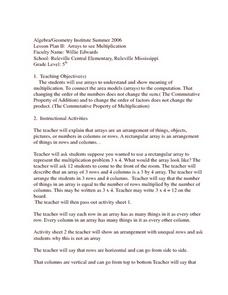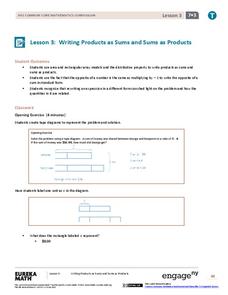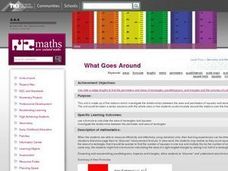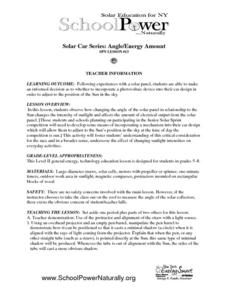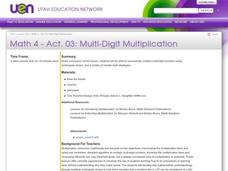Curated OER
Surface Area and Volume
Upper graders identify the surface area and attributes of figures that are measurable. They estimate, measure, and record perimeter, area, temperature change, and elapsed time, using a variety of strategies. They also determine the...
Pennsylvania Department of Education
Multiplication Using Arrays
Explore the concept of multiplication by using arrays. Classmates use arrays to gain a better understanding of multiplication. They break arrays apart to model the distributive property of multiplication over addition. The relationship...
Curated OER
Area Model of Multiplication Using Base 10 Manipulatives
Explore two-digit multiplication with your class as they work in groups to build models of two-digit multiplication using base 10 manipulatives. They construct rectangles replacing standard numbers with equivalent place values using...
Alabama Learning Exchange
Finding Prime
Fifth and sixth graders explore prime numbers. They work with a partner to build rectangular arrays using twelve tiles. Factor pairs are noted and recorded on graph paper. Pupils construct rectangular arrays with a prime number and...
Curated OER
Halves, Thirds, and Sixths
An excellent activity that effectively pulls together the concepts of area, fractions, and equivalent fractions! Using 3x2 rectangular arrays, 3rd graders are introduced to the concept of area in terms of square units. Building on this...
Curated OER
Arrays To See Multiplication
Fifth graders examine multiplication. They construct arrays to demonstrate specific multiplication facts. They identify examples and non-examples of arrays. Students use counters to model the commutative property of multiplication.
Curated OER
Shapes and Their Insides
Learners follow a series of instructions for drawing and coloring different shapes in order to learn the difference between the perimeter and area of a polygon. Then they are asked to find the perimeter and area of a 3x4 rectangular...
EngageNY
Writing Products as Sums and Sums as Products
Create rectangle and area models to help students understand expressions. The third installment in the 28-part series has pupils first represent expressions using rectangular array models. The exercises help scholars understand the...
Curated OER
What Goes Around
Fourth graders investigate the relationships between the area and perimeters of squares and rectangles. They calculate the perimeter of rectangles and squares using a formula. Students investigate the relationship between the perimeter...
Curated OER
Solar Car Series: Angle/Energy Amount
Does the angle of a solar panel change the output? Emerging engineers find out! Demonstrate for your class how they can angle a straw to match the angle of light rays coming from a source. Then turn them loose to experiment with the...
Curated OER
A Polynomial Quilt
Tenth graders create polynomial quilts. In this polynomials lesson, 10th graders use concrete models, such as construction paper, to create various shapes described. Students use the FOIL method to multiply terms and to get a square...
Curated OER
Multi-Digit Multiplication
Fourth graders practice mastering the ability to multiply multi-digit numbers utilizing rectangular arrays and a variety of mental math strategies. They model and illustrate meanings of multiplication and division of whole numbers and...
Curated OER
Multiplication: Building Models, Representations and Explanations
First graders explore multiplication concepts through skip counting, repeated addition and arrays. Using animal characteristics as a context, 1st graders solve problems using mathematical tools such as hundreds charts, number lines, ...
Alabama Learning Exchange
Miss Integer Finds Her Properties in Order
Access prior knowledge to practice concepts like order of operations and exponents. Your class can play this game as a daily review or as a warm-up activity when needed. They work in groups of four to complete and correct review problems.
Curated OER
Prime and Composite Numbers
Sixth graders inspect prime and composite numbers. Using graph paper, they draw as many different shaped rectangles as possible. They use the dimensions of the rectangles to discuss prime and composite numbers. Students create a chart...
Alabama Learning Exchange
Alex: Area Model of Multiplication Base 10 Manipulatives
Students will use base 10 manipulatives to build a rectangular array to represent double digit multiplication. Students will make the connection between the standard algorithm and the rectangular array.This lesson plan was created as a...
Alabama Learning Exchange
Alex: What's Your Question? Multiplication Word Problems
Students will explore multiplication and word problems. They will work cooperatively to examine a story scenario, list possible questions to develop a completed word problem and solve it using a variety of strategies. The students will...
